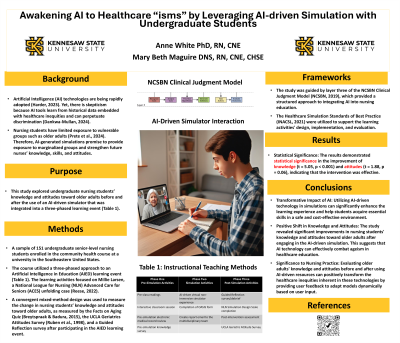Education
(19) Awakening AI to Healthcare “isms” by Leveraging AI-driven Simulation with Undergraduate Nursing Students
Friday, June 20, 2025
3:15 PM - 4:15 PM MST
Location: Plaza Ballroom Foyer

- AW
Anne White, PhD, RN, CNE
Professor of Nursing
Kennesaw State University
Kennesaw, Georgia, United States 
Mary Beth R. Maguire, DNS, RN, CNE, CHSE
SimCapture Impact Manager
Laerdal Medical
Kennesaw, Georgia, United States
Lead Author(s)
Co-Author(s)
Abstract : Background/Gap
Artificial Intelligence (AI) technologies are being rapidly adopted (Harder, 2023). Yet, there is skepticism because AI tools learn from historical data embedded with healthcare inequities and can perpetuate discrimination (Dankwa-Mullan, 2024). Additionally, nursing students have limited exposure to vulnerable groups such as older adults (Prete et al., 2024). Therefore, AI-generated simulations promise to provide exposure to marginalized groups and strengthen future nurses' knowledge, skills, and attitudes.
Purpose Statement:
This study aimed to explore undergraduate nursing students’ knowledge and attitudes toward older adults by integrating an AI-driven simulator within a three-phased learning event.
Theoretical Framework:
Layer Three of the NCSBN Clinical Judgement Model served as the theoretical framework for the learning event.
Methods:
A pre/post-test study design measured the change in nursing students’ (n=151) knowledge and attitudes toward older adults after participating in a three-phased learning event (interactive classroom event, AI-driven screen-based simulation, guided debrief).
Results:
Participants completed a pre/post Facts on Aging Quiz and Geriatric Attitude Survey to measure the change in nursing students’ knowledge and attitudes after the learning event. A paired sample t-test revealed a statistical significance at the 0.10 level (t = 1.88, p = 0.06) [attitudes] and < 0.001 ((t = 5.05, p < 0.001) [knowledge]. The guided debrief data was analyzed, revealing positive changes in ageism, empathy, and communication skills.
Conclusion/Significance:
The positive shift in knowledge and attitudes suggests that AI-driven technology can have a transformative impact on elevating simulation to address ageism while simultaneously informing AI models to mitigate healthcare inequities and discrimination.
Please include a short summary of your presentation that highlights why an attendee would want to participate in your session.: This study examined the effect of an AI-driven simulation on nursing students' knowledge and attitudes toward older adults. The three-phase learning event led to significant gains in knowledge. Positive shifts related to empathy, reduced ageism, and improved communication skills were also identified. Findings suggest AI holds promise to reduce healthcare inequities and enrich nursing education.
Artificial Intelligence (AI) technologies are being rapidly adopted (Harder, 2023). Yet, there is skepticism because AI tools learn from historical data embedded with healthcare inequities and can perpetuate discrimination (Dankwa-Mullan, 2024). Additionally, nursing students have limited exposure to vulnerable groups such as older adults (Prete et al., 2024). Therefore, AI-generated simulations promise to provide exposure to marginalized groups and strengthen future nurses' knowledge, skills, and attitudes.
Purpose Statement:
This study aimed to explore undergraduate nursing students’ knowledge and attitudes toward older adults by integrating an AI-driven simulator within a three-phased learning event.
Theoretical Framework:
Layer Three of the NCSBN Clinical Judgement Model served as the theoretical framework for the learning event.
Methods:
A pre/post-test study design measured the change in nursing students’ (n=151) knowledge and attitudes toward older adults after participating in a three-phased learning event (interactive classroom event, AI-driven screen-based simulation, guided debrief).
Results:
Participants completed a pre/post Facts on Aging Quiz and Geriatric Attitude Survey to measure the change in nursing students’ knowledge and attitudes after the learning event. A paired sample t-test revealed a statistical significance at the 0.10 level (t = 1.88, p = 0.06) [attitudes] and < 0.001 ((t = 5.05, p < 0.001) [knowledge]. The guided debrief data was analyzed, revealing positive changes in ageism, empathy, and communication skills.
Conclusion/Significance:
The positive shift in knowledge and attitudes suggests that AI-driven technology can have a transformative impact on elevating simulation to address ageism while simultaneously informing AI models to mitigate healthcare inequities and discrimination.
Please include a short summary of your presentation that highlights why an attendee would want to participate in your session.: This study examined the effect of an AI-driven simulation on nursing students' knowledge and attitudes toward older adults. The three-phase learning event led to significant gains in knowledge. Positive shifts related to empathy, reduced ageism, and improved communication skills were also identified. Findings suggest AI holds promise to reduce healthcare inequities and enrich nursing education.
Learning Objectives:
- Upon completion, participants will be able to analyze AI algorithms' role in perpetuating biases based on historical data embedded within healthcare inequities.
- Upon completion, participants will be able to explore the details of a three-phased educational event that leveraged AI-based technologies to affect nursing students’ knowledge and attitudes toward older adults.
- Upon completion, participants will be able to explain the change in nursing students’ knowledge and attitudes after participation in a three-phased educational event.

